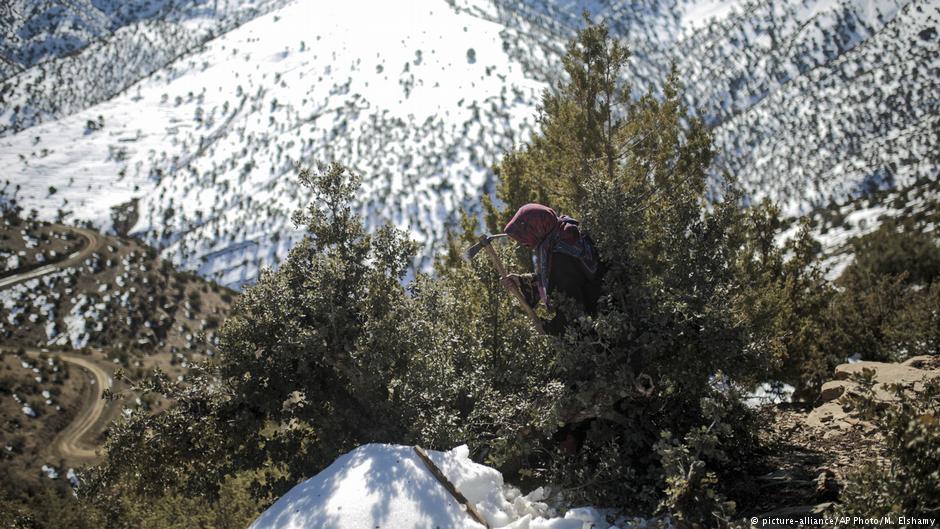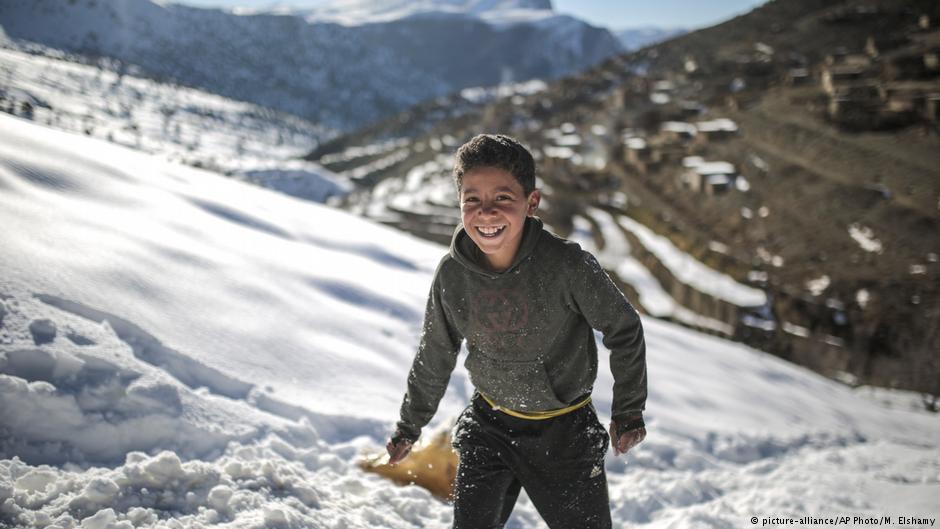Calling the King to account

On 15 February, Moroccan Prime Minister Saad Eddine El Othmani recognised the efforts of rescue teams targeting remote rural communities in the High and Middle Atlas Mountains besieged by the countryʹs heaviest snowfall in over 50 years. Othmani praised the "invisible heroes" – doctors, nurses, members of the military and transport workers for bringing emergency relief to the more than half a million Moroccans affected by severe winter storms that left several dead.
The Ministry of Interior revealed in a separate statement that the mobilisation provided direct humanitarian assistance to an estimated 370,000 people, including health services and emergency helicopter evacuations. According to figure released by the Ministry of the Interior, winter relief aid has been issued to 52,000 families since November 2017.
Isolated: with fatal consequences
However, communities affected by the snowstorms denounced the governmentʹs management of the situation, criticising the lack of anticipatory measures and the response capabilities of local and regional authorities.
"People are isolated, roads are blocked, farmers can no longer feed livestock," residents reported.
Several villages held demonstrations demanding the re-opening of roads and the arrival of help, as the blockade raised concerns over dwindling food, heating and medical supplies. In the worst hit areas snowfall exceeded 2 metres, while temperatures dropped to lows of -15 degrees Celsius.
While harsh weather is a familiar feature of winter for Moroccans living in the rural Atlas mountains, the severe snow storms this year isolated nearly 1200 villages, leaving them without access to roads, electricity and clean water for up to one week. Several fatalities were the result.
On 30 January, an ill woman in Azilal province died aboard a makeshift stretcher as villagers made a desperate attempt to carry her to a nearby hospital. The incident, which was recorded on a camera phone and shared on social media, highlighted just how isolated some areas are. In Midelt province, at least 4 deaths were reported, including a young man who was found frozen to death. In another case, a woman was killed after the roof of her home collapsed under the weight of snow.It was not until 7 February, following instructions from by Moroccan King Mohammed VI, did the government announce its emergency mobilisation programme. According to El Othmani, humanitarian relief will continue over a 3-month period with assistance from the Red Crescent and other agencies to distribute supply packages containing basic food items, blankets and livestock feed.
Rescue efforts cannot hide socio-economic grievances
Although El Othmani described the snowfallʹs arrival as "unexpected", the episode has once again exposed the underdevelopment in the rural enclaves of the Atlas Mountains. Critics claim that the bitter weather conditions merely highlight the governmentʹs neglect of these regions, who have earned a reputation for being left in the cold without the basic necessities required to endure the winter, often with fatal consequences.
In the winter of 2006/2007, more than 20 children from the High Atlas village of Anfgou died as a result of the cold and snow. Four years later, harsh winter conditions claimed another 11 lives from the same village, including a week-old baby.

Nearly 40% of Moroccoʹs rural population lives below the poverty line, meaning that many families do not have the means to cope with severe winter weather.
"The purchasing power of the population is very low; for some even buying wood for heating is becoming impossible," Said Ahbar of the Moroccan Association for Human Rights explained to Yabiladi news, when describing the difficulty villages in rural Midelt province faced this month.
These regions also suffer from inadequate infrastructure such as poor roads and a lack of electricity and clean water. Municipal governments say they do not have the budgets to cope with emergency situations, although residents commonly complain of corruption and the misappropriation of state funds.
The Moroccan government has introduced infrastructure projects to the Atlas in recent years, however an estimated 60% of rural Moroccans may have only a limited access to electricity, sanitation and water, says the World Bank.Some trace the situation back to Moroccoʹs colonial period when France designated its protectorate into a "useful" zone and remaining lands that encompasses much of the Atlas mountains today. Images of inhabitants traversing rocky mountain paths starkly contrast with Moroccoʹs glamorous urban development projects and popular tourist destinations. The country ranks 123rd on the global human development index.
Amazigh bear the brunt
Meanwhile, Amazigh rights activists believe the division is also a continuation of the stateʹs ongoing discrimination against Moroccoʹs Amazigh communities, many of which are concentrated in the Atlas highlands. They accuse the state of expropriating traditional tribal lands, exploiting natural resources like timber and silver in the process and neglecting to reinvest the profits into social and economic projects.

"The officials in this country are prepared to discuss any subject that benefits them, but are not at all ready to talk about the subject of wealth, of minerals and the Amazigh in the mountains," commented Amazigh writer Montasir Ithri in an op-ed written on 7 February.
Such projects, pro-Amazigh voices say, would mitigate the challenges posed by the winter months and avoid possible future humanitarian catastrophes. When this yearʹs snowfall started to blanket the Atlas, some Amazigh organisations were already fundraising for emergency aid to distribute to the beleaguered communities in the Atlas.
"As people die daily from cold, hunger and a lack of medicine, the Amazigh cannot afford to wait until spring to receive help," said an organiser of one of the campaigns. "We would like to see King Mohammed VI allocate some of his wealth and state resources to these suffering regions to try and put a stop to this crisis that seems to occur every winter."
Matthew Greene
© Qantara.de 2018
